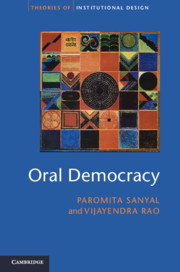Crossref Citations
This Book has been
cited by the following publications. This list is generated based on data provided by Crossref.
Sanyal, Paromita
Rao, Vijayendra
and
Prabhakar, Umang
2019.
How Women Talk in Indian Democracy.
Qualitative Sociology,
Vol. 42,
Issue. 1,
p.
49.
Alnemr, Nardine
Choucair, Thais
and
Curato, Nicole
2020.
Can the poor exercise deliberative agency in a multimedia saturated society? Lessons from Brazil and Lebanon.
Political Research Exchange,
Vol. 2,
Issue. 1,
p.
1802206.
Boswell, John
and
Corbett, Jack
2021.
Democracy, Interpretation, and the “Problem” of Conceptual Ambiguity: Reflections on the V-Dem Project’s Struggles with Operationalizing Deliberative Democracy.
Polity,
Vol. 53,
Issue. 2,
p.
239.
Bharathi, Naveen
Malghan, Deepak
Mishra, Sumit
and
Rahman, Andaleeb
2021.
Diversity Deficit and Scale-Flip.
The Journal of Development Studies,
Vol. 57,
Issue. 4,
p.
695.
Curato, Nicole
2021.
Interruptive protests in dysfunctional deliberative systems.
Politics,
Vol. 41,
Issue. 3,
p.
388.
2021.
Governance Drivers of Rural Water Sustainability: Collaboration in Frontline Service Delivery.
Kumar, Tanu
2022.
Home Price Subsidies Increase Local-Level Political Participation in Urban India.
The Journal of Politics,
Vol. 84,
Issue. 2,
p.
831.
2022.
Measuring what Matters: Principles for a Balanced Data Suite that Prioritizes Problem-Solving and Learning.
Curato, Nicole
Sass, Jensen
Ercan, Selen A
and
Niemeyer, Simon
2022.
Deliberative democracy in the age of serial crisis.
International Political Science Review,
Vol. 43,
Issue. 1,
p.
55.
Mangla, Akshay
2022.
Social conflict on the front lines of reform: Institutional activism and girls' education in rural India.
Public Administration and Development,
Vol. 42,
Issue. 1,
p.
95.
Grillos, Tara
2022.
Participation Improves Collective Decisions (When It Involves Deliberation): Experimental Evidence From Kenya.
British Journal of Political Science,
Vol. 52,
Issue. 4,
p.
1728.
Swarnakar, Pradip
and
Singh, Mudit Kumar
2022.
Local Governance in Just Energy Transition: Towards a Community-Centric Framework.
Sustainability,
Vol. 14,
Issue. 11,
p.
6495.
Banerjee, Mukulika
2023.
Self-Help, Natality and ‘Civic Growth’.
The Journal of Development Studies,
Vol. 59,
Issue. 7,
p.
1046.
2023.
The Added Value of Local Democracy: Evidence from a Natural Experiment in India.
Lawrence, Pareena Gupta
and
Hensly, Catherine
2023.
Gender-Based Policies and the Role of Patriarchal Norms: Evidence from Northern India.
Feminist Economics,
Vol. 29,
Issue. 2,
p.
252.
Rahman, Andaleeb
and
Pingali, Prabhu
2024.
The Future of India's Social Safety Nets.
p.
95.





